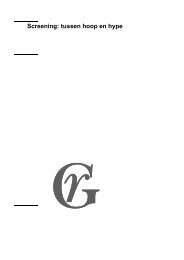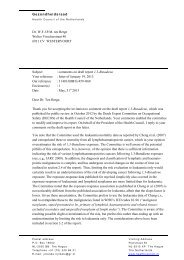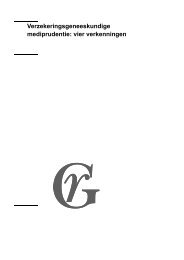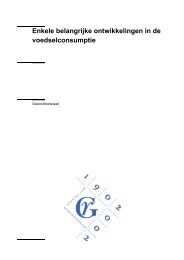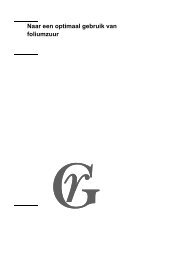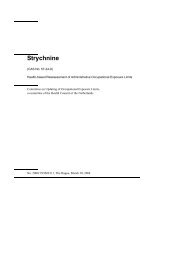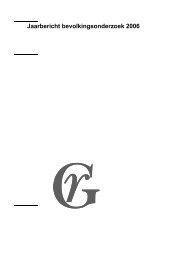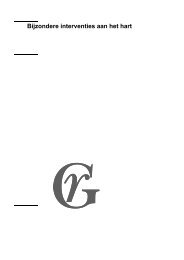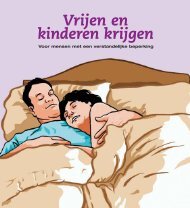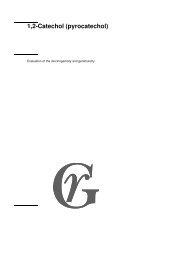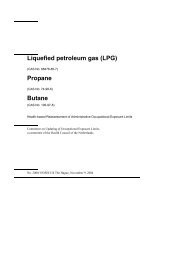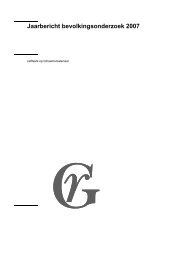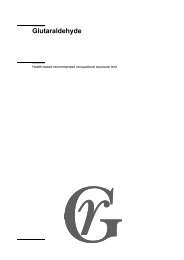Health Council of the Netherlands Reports 2003 - Gezondheidsraad
Health Council of the Netherlands Reports 2003 - Gezondheidsraad
Health Council of the Netherlands Reports 2003 - Gezondheidsraad
Create successful ePaper yourself
Turn your PDF publications into a flip-book with our unique Google optimized e-Paper software.
when giving information to <strong>the</strong> potential donor. The risk <strong>of</strong> adverse<br />
consequences to <strong>the</strong> health <strong>of</strong> <strong>the</strong> living donor (e.g. hypertension or impaired<br />
kidney function) has also been shown to be small: living kidney donors have a<br />
normal life expectancy. Finally, one should not ignore <strong>the</strong> fact that living donor<br />
transplants are financially cost-saving by reducing (or even avoiding) expensive<br />
chronic dialysis treatment. All in all <strong>the</strong> benefits <strong>of</strong> living donor kidney<br />
transplants more than outweigh <strong>the</strong> possible disadvantages to <strong>the</strong> donor.<br />
An important recent development is <strong>the</strong> laparoscopic method for donor<br />
nephrectomy. Instead <strong>of</strong> removal through classical ‘open’ surgery, in this<br />
procedure <strong>the</strong> kidney is removed via a minimally invasive procedure using an<br />
endoscope. The advantages to <strong>the</strong> donor are claimed to be: a smaller scar and less<br />
pain, a shorter period <strong>of</strong> hospitalisation, and rapid rehabilitation. This new<br />
technique requires fur<strong>the</strong>r standardization and assessment.<br />
These past years a debate has started concerning <strong>the</strong> limits <strong>of</strong> living kidney<br />
donation. In addition to family donation, involving genetically related donors,<br />
donation by emotionally related donors (in particular spouse/partner) has now<br />
been widely accepted. This is much less <strong>the</strong> case for donation by persons who are<br />
more distantly related to <strong>the</strong> recipient (e.g. friends or in-laws), or donation by<br />
persons who share no relationship at all with <strong>the</strong> recipient (<strong>the</strong> unrelated<br />
anonymous donors). Also, different types <strong>of</strong> cross-exchange between donor and<br />
recipient pairs, who are unable to donate directly because <strong>of</strong> ABOincompatibility<br />
or <strong>the</strong> presence <strong>of</strong> reactive antibodies against <strong>the</strong> donor, now<br />
<strong>of</strong>fer realistic possibilities (so-called paired kidney exchange or crossover<br />
donation).<br />
It is important also to find adequate medical and moral justification for <strong>the</strong>se<br />
new types <strong>of</strong> living donation. The <strong>Health</strong> <strong>Council</strong> concludes that genetically<br />
unrelated living kidney donors (emotionally related as well as unrelated<br />
anonymous donors) do not run greater risk to <strong>the</strong>ir health than genetically related<br />
living donors. In addition, <strong>the</strong> <strong>Council</strong> has established that <strong>the</strong> relevant Dutch<br />
legislation (<strong>the</strong> Organ Donation Act <strong>of</strong> 1996) does not present any obstacle to<br />
this type <strong>of</strong> donation. Again, from an ethical perspective, <strong>the</strong>re are no conclusive<br />
arguments to exclude <strong>the</strong>se novel types <strong>of</strong> unrelated living donation beforehand.<br />
However, in <strong>the</strong>se cases it seems justified to do a careful assessment <strong>of</strong> <strong>the</strong><br />
motives and background <strong>of</strong> <strong>the</strong> potential donor. Paid or commercial donation is<br />
rejected by <strong>the</strong> <strong>Health</strong> <strong>Council</strong> (as far as <strong>the</strong> situation in <strong>the</strong> Ne<strong>the</strong>rlands is<br />
concerned).<br />
The <strong>Council</strong> thinks it is feasible in <strong>the</strong> coming years to increase <strong>the</strong> number<br />
<strong>of</strong> living donor kidney transplants in <strong>the</strong> Ne<strong>the</strong>rlands up to 250 per year. An<br />
28 <strong>Health</strong> <strong>Council</strong> <strong>of</strong> <strong>the</strong> Ne<strong>the</strong>rlands; <strong>Reports</strong> <strong>2003</strong>



